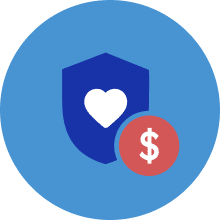Cash Management is Not About Having a Budget.
It’s a Process to Help You Achieve Financial Independence.
Cash management is the first and most important step in the financial planning process. It’s often confused with having a budget or having to cut spending, but it’s much bigger than that.
Cash management helps you recognize the relationship and timing between your income, expenses, and savings. Having this knowledge gives you the power to make intelligent decisions and achieve financial independence.
Why Cash Management Matters
Cash management is an essential part of every financial plan. The process identifies where money is coming from, how much you need to maintain your lifestyle without worry, and how much you need to save for important milestones.
The wealth advisors at Access Wealth address cash management at the beginning of the financial planning process. The intent is to understand your cash needs in the short- and long-term and help you identify how to achieve all your goals.
Learn About Our ProcessCash Flow Planning Helps You Prioritize
Understanding your cash flow helps you organize your financial life. It answers the big question: How will you prioritize and fund all your financial goals? Without a plan in place, simultaneously funding all these priorities may prove impossible. Some of the most common goals we hear from clients include:






Save for Retirement

Purchase a Vacation Home



A Financial Plan Answers These Cash Management Questions
- How will you raise cash in retirement?
How you will fund your lifestyle once retired and no longer working is a question that must be answered before the big day. A cash flow analysis and financial plan can help you evaluate different scenarios so that you can make the right short- and long-term financial decisions. - How much income can you count on?
We help you identify every available income source, including employment, rental income, dividends, alimony, pension, Social Security, and retirement saving distributions. - How much cash do you need?
We help you determine your fixed expenses (e.g., housing, transportation, and health insurance) and encourage you to incorporate your desired discretionary spending (i.e., entertainment, travel, and shopping). - If there is a cash surplus, how will you save that money?
It’s important to generate meaningful returns on your investment portfolio. A 1% interest-bearing checking account won’t benefit you long-term. We can show you ways to invest that will provide enough cash for emergencies and your current needs.
Cash Flow Planning Made Easy
We make the cash flow planning process easy by providing you with a cash flow checklist to help you organize your financial life. The checklist enables you to assess your cash inflows and outflows monthly, quarterly, and annually.
Next, we create a 5-year cash flow that incorporates the anticipated inflation rate to predict how inflation will impact your expenses long-term. This forecast can help you decide if you are on the right track or if changes are needed.
Finally, we conduct annual reviews of your cash flow and goals to keep you on track.
Knowledge is power, so we give clients access to an online Personal Financial Portal. The Portal allows you to aggregate all your accounts and financial activity, giving you an easy-to-understand snapshot of your net worth and spending habits.
Cash Flow Management Lowers Taxes
Having a positive cash flow is good, but you could end up owing more in taxes without proper tax planning. So, as part of your financial plan, we examine whether you are managing your savings tax-efficiently.
For example, if you’re not maximizing your 401(k) plan or other tax-efficient retirement savings plans, we discuss doing so. This one step can help you save for retirement, save you tax dollars, and improve your cash flow, freeing up dollars you can put toward other goals, such as travel, college, or insurance.
So, what are you saving for? What lifestyle do you want? When will you retire, and what will you do with your free time?
Speak with an Access Wealth advisor today and learn how a financial plan and an assessment of your cash management can help you achieve all your financial and personal goals.
Plan for a Life Well Lived. Contact us to learn how we can help.
© 2025 Access Wealth. All Rights Reserved.






